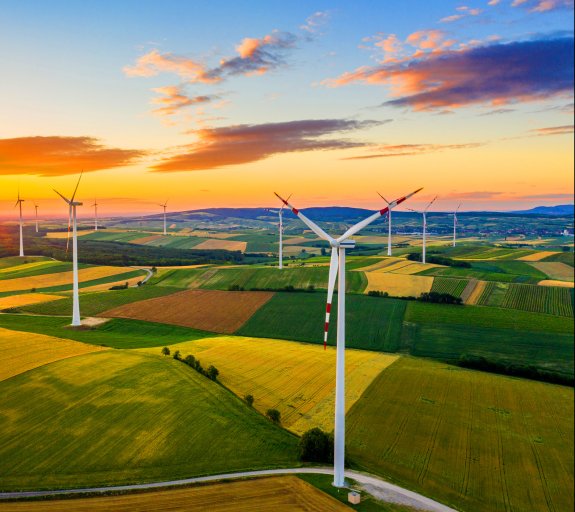
The impact of the Ukraine crisis on climate change
- 07 June 2022 (10 min read)
What the impact of war means for the race to net zero
- Russia’s invasion of Ukraine has significantly disrupted energy markets and accelerated the EU’s ambition to reduce its dependence on Russian fossil fuels.
- The European Commission plans to accelerate its already ambitious renewable technology implementation plans, which should raise the average emissions reduction pace to -5.0% per annum, from -4.8%.
- However, we are sceptical of Europe’s ability to pivot away from Russian gas as quickly as planned, and of its goals to grow renewable technology, particularly wind, at the envisaged pace. Even as planned, we estimate Europe will remain vulnerable to any interruption of gas supplies until 2024 – in practice this could be longer.
- The expected gas shortfall is likely to be met by existing fossil fuel capacity, including an increase in coal-fired generation. This will likely raise emissions to a range that is likely to be higher over the coming decade than either ‘Fit for 55’ or the EU’s new plans suggest.
- The 1970s marked a key turning point in oil intensity usage. The current crisis could mark a similar turning point for energy markets ushering in a range of new technologies to lower emissions output.
War in Ukraine will impact the battle against climate change
There are no doubt multiple factors that led to Russia’s decision to invade Ukraine. One was likely to have been a calculation that European dependence on Russian fossil fuels – particularly gas – would limit the severity of any resulting sanctions on Russia from the West. Such a judgement would have considered low European gas inventories, elevated inflation pressures and the fact that Europe’s Fit for 55 climate action plan envisaged a gradual reduction of gas imports over the coming decade in a bid to reduce greenhouse gas (GHG) emissions by 55% of 1990 levels by 2030. Such an analysis would have suggested some leverage of Russian gas supply now, but that would be likely to fade over time.
Such a calculation now appears misplaced. The sanctions against Russia have been deeper, more far-reaching, and more unified than many had expected. Moreover, the consequence of the inevitable increase in energy prices – particularly for European natural gas – has been for the European Commission to propose an even quicker shift in gas imports to reduce Europe’s dependency on Russian supply. Europe has already banned Russian coal, but it is now considering sanctions on Russian imports of oil and even gas.
In this paper, we look at Europe’s plans to reduce its dependency on Russian gas. We calculate the likely impact on the EU’s GHG emissions if Russian gas supplies to Europe were halted – requiring substitution, and higher-emitting fuels, to be used for generation capacity to temporarily fill the breach. However, in the medium term the swifter shift to non-fossil fuel generation would likely see emissions fall faster. We then critically assess the plausibility of these assumptions. Exhibit 1 illustrates our estimates of the impact on GHG emissions of the EU’s new plans, and an estimated range of a likely path of emissions.

Our experts and investment teams outline their key convictions
Visit the instituteDisclaimer
The information on this website is intended for investors domiciled in Switzerland.
AXA Investment Managers Switzerland Ltd (AXA IM) is not liable for unauthorised use of the website.
This website is for advertising and informational purpose only. The published information and expression of opinions are provided for personal use only. The information, data, figures, opinions, statements, analyses, forecasts, simulations, concepts and other data provided by AXA IM in this document are based on our knowledge and experience at the time of preparation and are subject to change without notice.
AXA IM excludes any warranty (explicit or implicit) for the accuracy, completeness and up-to-dateness of the published information and expressions of opinion. In particular, AXA IM is not obliged to remove information that is no longer up to date or to expressly mark it a such. To the extent that the data contained in this document originates from third parties, AXA IM is not responsible for the accuracy, completeness, up-to-dateness and appropriateness of such data, even if only such data is used that is deemed to be reliable.
The information on the website of AXA IM does not constitute a decision aid for economic, legal, tax or other advisory questions, nor may investment or other decisions be made solely on the basis of this information. Before any investment decision is made, detailed advice should be obtained that is geared to the client's situation.
Past performance or returns are neither a guarantee nor an indicator of the future performance or investment returns. The value and return on an investment is not guaranteed. It can rise and fall and investors may even incur a total loss.
AXA Investment Managers Switzerland Ltd.